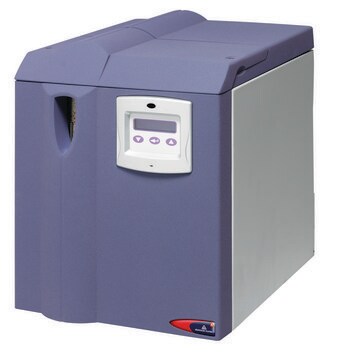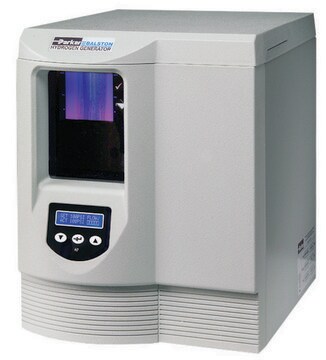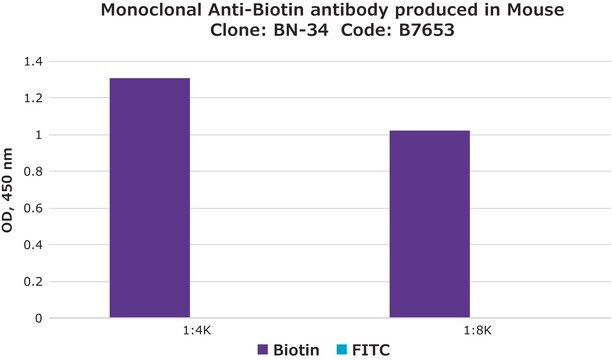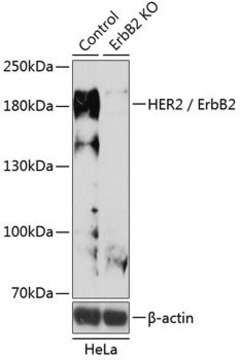30558
Abberior® STAR 635, NHS ester
for STED application
Synonyme(s) :
super-resolution Microscopy
Se connecterpour consulter vos tarifs contractuels et ceux de votre entreprise/organisme
About This Item
Code UNSPSC :
12352108
Nomenclature NACRES :
NA.32
Produits recommandés
Niveau de qualité
Concentration
≥50.0% (degree of coupling)
Solubilité
DMF: 0.25 mg/mL, clear
Fluorescence
λex 635 nm; λem 655 nm±10 nm in PBS, pH 7.4
Température de stockage
−20°C
Description générale
Absorption Maximum, λmax: 635 nm (PBS, pH 7.4)
Extinction Coefficient, ε(λmax): 110,000 M-1cm-1 (PBS, pH 7.4)
Correction Factor, CF260 = ε260/εmax: 0.26 (PBS, pH 7.4)
Correction Factor, CF280 = ε280/εmax: 0.38 (PBS, pH 7.4)
Fluorescence Maximum, λfl: 656 nm (aq. acetonitrile; MeOH)
655 nm (PBS, pH 7.4)
Recommended STED Wavelength, λSTED: 750 −780 nm
Fluorescence Quantum Yield, η: 0.88 (PBS, pH 7.4)
Fluorescence Lifetime, τ: 2.8 (PBS, pH 7.4)
Extinction Coefficient, ε(λmax): 110,000 M-1cm-1 (PBS, pH 7.4)
Correction Factor, CF260 = ε260/εmax: 0.26 (PBS, pH 7.4)
Correction Factor, CF280 = ε280/εmax: 0.38 (PBS, pH 7.4)
Fluorescence Maximum, λfl: 656 nm (aq. acetonitrile; MeOH)
655 nm (PBS, pH 7.4)
Recommended STED Wavelength, λSTED: 750 −780 nm
Fluorescence Quantum Yield, η: 0.88 (PBS, pH 7.4)
Fluorescence Lifetime, τ: 2.8 (PBS, pH 7.4)
Application
- Abberior® STAR 635 goat anti-rabbit antibody has been used for STED (stimulated emission depletion) imaging of primary cultured striatal neurons obtained from rats.
- Abberior® STAR 635 anti-rabbit antibody has been used for STED imaging of non-sensory supporting cells obtained from cochlea of rats and mice.
- Abberior® STAR 635 conjugated with secondary antibody has been used for STED imaging of microtubules in cells.
Adéquation
Designed and tested for fluorescent super-resolution microscopy
Autres remarques
Informations légales
abberior is a registered trademark of Abberior GmbH
Produit(s) apparenté(s)
Réf. du produit
Description
Tarif
Code de la classe de stockage
11 - Combustible Solids
Classe de danger pour l'eau (WGK)
WGK 3
Point d'éclair (°F)
Not applicable
Point d'éclair (°C)
Not applicable
Faites votre choix parmi les versions les plus récentes :
Déjà en possession de ce produit ?
Retrouvez la documentation relative aux produits que vous avez récemment achetés dans la Bibliothèque de documents.
Hans Blom et al.
PloS one, 8(9), e75155-e75155 (2013-09-24)
The phosphoprotein DARPP-32 (dopamine and cyclic adenosine 3´, 5´-monophosphate-regulated phosphoprotein, 32 kDa) is an important component in the molecular regulation of postsynaptic signaling in neostriatum. Despite the importance of this phosphoprotein, there is as yet little known about the nanoscale
Jenu Varghese Chacko et al.
Journal of biomedical optics, 19(10), 105003-105003 (2014-10-08)
Atomic force microscopes (AFM) provide topographical and mechanical information of the sample with very good axial resolution, but are limited in terms of chemical specificity and operation time-scale. An optical microscope coupled to an AFM can recognize and target an
Arnaud P Giese et al.
Development (Cambridge, England), 139(20), 3775-3785 (2012-09-20)
Vangl2 is one of the central proteins controlling the establishment of planar cell polarity in multiple tissues of different species. Previous studies suggest that the localization of the Vangl2 protein to specific intracellular microdomains is crucial for its function. However
S W Hell et al.
Optics letters, 19(11), 780-782 (1994-06-01)
We propose a new type of scanning fluorescence microscope capable of resolving 35 nm in the far field. We overcome the diffraction resolution limit by employing stimulated emission to inhibit the fluorescence process in the outer regions of the excitation
Marcus Dyba et al.
Nature biotechnology, 21(11), 1303-1304 (2003-10-21)
We report immunofluorescence imaging with a spatial resolution well beyond the diffraction limit. An axial resolution of approximately 50 nm, corresponding to 1/16 of the irradiation wavelength of 793 nm, is achieved by stimulated emission depletion through opposing lenses. We
Notre équipe de scientifiques dispose d'une expérience dans tous les secteurs de la recherche, notamment en sciences de la vie, science des matériaux, synthèse chimique, chromatographie, analyse et dans de nombreux autres domaines..
Contacter notre Service technique




